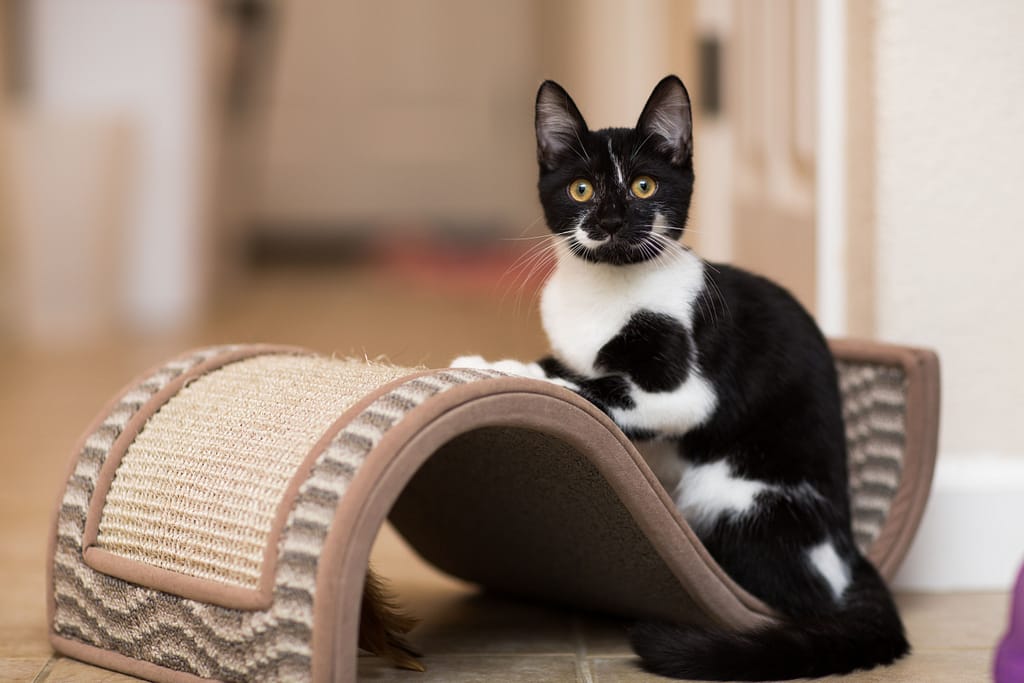A Beginner’s Guide to Kitten Care

Adopting a kitten brings immense joy and companionship into a household. The playful antics and affectionate nature of kittens can brighten up any home, offering endless moments of laughter and comfort.
However, with this joy comes the significant responsibility of ensuring the well-being and health of your new feline friend. Proper care is crucial in the early stages of a kitten’s life, as it sets the foundation for a healthy and happy adulthood.
By providing the necessary attention, nutrition, veterinary care, and socialization, you help your kitten adapt to its new environment and thrive.
Table of Contents
1. Preparing Your Home
Creating a Safe Environment

When bringing a new kitten into your home, it’s essential to create a safe and welcoming environment. Begin by designating a small, quiet area where your kitten can acclimate to their new surroundings.
This space should be away from any loud noises, high traffic areas, and other pets until your kitten feels comfortable.
Additionally, make sure the area is kitten-friendly by removing any items that could be hazardous, including small objects that could be swallowed, electrical cords, and toxic plants.
Essential Supplies
To ensure your kitten feels at home, you’ll need to gather some essential supplies:
- Litter Box: Choose a litter box that is easy for your kitten to access and clean. Make sure to find a location where the kitten feels safe using it.
- Scratching Posts: Cats have a natural instinct to scratch. Providing scratching posts helps deter them from scratching furniture and supports their need to stretch and maintain their claws.
- Kitten Food: High-quality kitten food is crucial for proper growth and development. Ensure the food is specifically formulated for kittens to meet their nutritional needs.
- Bedding: Offer a cozy bed or blankets where your kitten can rest and feel secure.
- Toys: Interactive and engaging toys are excellent for keeping your kitten mentally and physically stimulated.
- Food and Water Bowls: Opt for bowls that are easy to clean and appropriately sized for a kitten.
- Carrier: A secure carrier is necessary for trips to the vet or other outings.
Kitten-Proofing Tips
Kitten-proofing your home is similar to baby-proofing:
- Secure Cords and Wires: Use cord covers or tape to secure electrical wires and cords out of reach.
- Store Harmful Substances: Chemicals, cleaning supplies, and medications should be stored in cabinets with child-proof latches.
- Remove Potential Hazards: Keep small objects, rubber bands, hair ties, and plastic bags away from your kitten’s reach to prevent accidental ingestion.
- Cover Openings: Ensure that windows, balcony doors, and other openings are securely closed or fitted with screens to prevent falls.
- Check for Hidden Dangers: Look around furniture and appliances for any small spaces where a curious kitten could get stuck and block or cover them accordingly.
By preparing your home with these guidelines, you will create a safe, comfortable space where your kitten can explore, grow, and thrive.
2. Nutrition and Diet

Appropriate Diet for Kittens
Feeding your kitten a well-balanced diet is vital for their growth and overall health. Kittens require a diet that is rich in protein, vitamins, and minerals to support their rapid development.
Specially formulated kitten food, both wet and dry, is designed to meet these nutritional needs.
Choose high-quality kitten food that lists meat as the primary ingredient and avoid those with excessive fillers like corn, wheat, and soy.
Additionally, consult with your veterinarian to ensure the chosen food meets your kitten’s specific dietary requirements.
Feeding Schedules and Portion Sizes
Kittens have small stomachs but high energy needs, requiring more frequent meals than adult cats. Typically, kittens up to six months old should be fed three to four times a day. After six months, you can reduce the frequency to two to three times a day.
It’s crucial to follow the portion sizes recommended on the food packaging or as advised by your veterinarian, as overfeeding can lead to obesity while underfeeding can impede growth and development.
It’s also beneficial to establish a consistent feeding schedule to help regulate your kitten’s digestion and bathroom habits.
Importance of Fresh Water
Always provide your kitten with access to fresh, clean water. Hydration is essential for their overall health, aiding in digestion, nutrient absorption, and maintaining body temperature.
Change the water daily and ensure the water bowl is washed regularly to prevent the buildup of bacteria. If you find your kitten is not drinking enough water, consider a pet water fountain, as some cats prefer running water.
Monitoring water intake is also important; a sudden increase or decrease could indicate health issues that require a vet’s attention.
3. Health and Veterinary Care

First Vet Visit and Vaccinations
Taking your kitten to the veterinarian for their first visit is an essential step in ensuring their long-term health.
Ideally, this visit should occur within the first week of bringing your kitten home. The vet will perform a comprehensive physical examination, checking for signs of illness or congenital conditions.
During this visit, it’s also vital to discuss a vaccination schedule. Core vaccines protect against feline distemper, calicivirus, rhinotracheitis, and rabies, and are typically administered in a series of shots beginning at six to eight weeks of age.
Your vet may also recommend additional vaccines based on your kitten’s lifestyle and potential exposure to other animals.
Common Health Issues in Kittens
Kittens are susceptible to various health issues during their early stages of life. Some of the common problems include upper respiratory infections, gastrointestinal parasites like worms and protozoa, and feline panleukopenia (also known as feline distemper). Other concerns might include ear mites, which can cause irritation and infection, and flea infestations.
Early diagnosis and treatment of these conditions by a vet are crucial for preventing more severe health complications.
Watch for symptoms such as persistent sneezing, diarrhea, lethargy, and changes in appetite or behavior, and consult your veterinarian if any of these arise.
Regular Check-Ups and Preventive Care
Regular veterinary check-ups play a crucial role in maintaining your kitten’s health and well-being. Typically, kittens should have vet visits every three to four weeks until they are about four months old, which allows for timely vaccinations and monitoring of their growth and development.
Routine check-ups are also an opportunity to discuss preventive care measures, such as spaying or neutering, dental hygiene, and parasite control.
By adhering to a schedule of regular vet visits, you can ensure early detection and treatment of potential health issues, setting the foundation for a healthy, happy life for your feline friend.
4. Socialization and Training

Importance of Early Socialization
Early socialization is crucial for kittens to develop into well-adjusted adult cats.
Introducing your kitten to different environments, people, and animals in a positive and controlled manner helps them become more adaptable and less fearful.
The socialization window for kittens is typically between two to seven weeks of age, during which they are more receptive to new experiences.
Gentle handling, exposure to various sounds, and short visits from friends or family can all contribute to a well-rounded socialization process.
A well-socialized kitten is more likely to be confident, friendly, and adaptable in various situations throughout its life.
Basic Training Tips
Training your kitten not only helps manage their behavior but also strengthens the bond between you and your pet.
Litter Box Training
Litter box training should begin as soon as your kitten arrives home. Start by placing the litter box in a quiet, accessible location and gently place your kitten inside it.
Most kittens instinctively know how to use a litter box, but you might need to show them where it is several times initially.
Keep the litter box clean, as a dirty box may deter your kitten from using it.
Scratching Behavior
Kittens have an instinct to scratch, so providing appropriate outlets is essential. Invest in scratching posts or pads and place them in areas where your kitten likes to scratch.
Encourage use by sprinkling catnip on the posts or playing with toys near them.
If your kitten starts scratching furniture, redirect their attention to the scratching post. Consistent redirection and rewarding with treats or affection can reinforce positive scratching habits.
Encouraging Positive Interactions with People and Other Pets
Encouraging positive interactions with people and other pets helps foster a friendly and peaceful home environment.
Allow your kitten to approach new people and animals at their own pace, ensuring all interactions are calm and positive. Supervise playtime to prevent rough behavior, and reward your kitten with treats and praise for calm, friendly interactions.
Introducing your kitten to other pets slowly and in a controlled manner can help ensure harmonious relationships. Gradual desensitization and positive reinforcement during these introductions can make the transition smoother for all involved.
5. Play and Enrichment

Importance of Play for Physical and Mental Stimulation
Playtime is essential for a kitten’s physical and mental development. Engaging in regular play helps kittens build strong muscles, improve coordination, and maintain a healthy weight.
Furthermore, play provides essential mental stimulation, preventing boredom and reducing the likelihood of developing behavioral issues. Interactive play sessions also offer an excellent opportunity for you to bond with your kitten, fostering a trusting and loving relationship.
Recommended Toys and Activities
A variety of toys can cater to your kitten’s playful nature and curiosity. Wand toys with feathers or strings, interactive puzzle toys, and small balls are great for keeping your kitten entertained and active.
Rotating toys regularly can keep your kitten interested and excited.
Additionally, creating opportunities for your kitten to explore and engage in activities such as chasing laser pointers or climbing cat trees can enrich their environment and provide daily exercise.
Safe Spaces and Hideaways
Providing safe spaces and hideaways is essential for your kitten’s sense of security and well-being. These areas allow your kitten to retreat and relax, which is particularly important in a busy household.
Consider setting up cozy spots with soft bedding, such as cat tents, boxes, or even a dedicated shelf in a quiet part of the house.
These hideaways offer a sanctuary where your kitten can rest and recharge, contributing to their overall sense of comfort and happiness.
6. Grooming and Hygiene

Basic Grooming Needs
Regular grooming is essential for keeping your kitten healthy and clean. Brushing your kitten’s fur helps remove loose hair, reduces shedding, and prevents matting.
For short-haired kittens, a weekly brushing should suffice, while long-haired kittens may require more frequent grooming to keep their coats tangle-free.
Bathing your kitten is generally not necessary unless they get particularly dirty or have a skin condition that requires it. If bathing is needed, use a kitten-specific shampoo and ensure the water is warm, but not hot.
Always dry your kitten thoroughly after the bath to prevent them from getting cold.
Nail trimming is another important aspect of grooming. Regularly trimming your kitten’s nails can prevent overgrowth and reduce the risk of injury to both your kitten and your furniture.
Use a pair of small, sharp nail clippers designed for cats and trim only the tips of the nails, being careful to avoid the quick, which is the pink area that contains blood vessels.
Dental Care Tips
Dental health is a crucial component of your kitten’s overall well-being. Establishing a dental care routine early on can help prevent issues such as plaque buildup, gingivitis, and bad breath.
Start by gently brushing your kitten’s teeth with a kitten-specific toothbrush and toothpaste. Gradually introduce the toothbrush, allowing your kitten to get used to the sensation.
In addition to brushing, providing dental treats or toys designed to promote oral health can help keep your kitten’s teeth clean.
Regular veterinary check-ups should include dental examinations to catch any potential issues early.
Keeping the Litter Box Clean
Maintaining a clean litter box is vital for your kitten’s health and comfort. A dirty litter box can deter your kitten from using it, leading to accidents around the house.
Scoop the litter box daily to remove waste, completely change the litter, and sanitize the box with mild soap and water at least once a week.
Place the litter box in a quiet, easily accessible location, and consider using unscented clumping litter to help control odors.
If you have multiple cats, provide one litter box per cat plus an extra to ensure each cat has ample access.
Keeping the litter box clean and fresh encourages your kitten to use it consistently and helps maintain a hygienic living environment.
7. Handling Behavioral Issues

Understanding Common Kitten Behaviors
Kittens are naturally curious and energetic, often engaging in behaviors that may seem problematic but are typical of their developmental stage.
Common behaviors include pouncing, biting, scratching, and climbing. These actions are part of a kitten’s way of exploring their environment, honing their hunting skills, and learning boundaries.
Understanding that these behaviors are normal and recognizing the need to guide your kitten toward appropriate conduct is crucial for nurturing a well-adjusted adult cat.
Strategies for Addressing Biting, Scratching, and Other Issues
To address biting, provide your kitten with suitable chew toys and discourage biting human skin by immediately stopping play and redirecting to a toy when they bite.
When dealing with scratching, encourage the use of scratching posts as mentioned previously, and consistently redirect your kitten to these posts whenever they start scratching furniture.
Apply deterrent sprays or use protective covers on furniture to discourage unwanted scratching behavior.
For other issues such as excessive meowing or destructive behavior, ensure your kitten’s mental and physical needs are being met through ample playtime, enrichment activities, and interaction.
Creating a structured routine and providing positive reinforcement for good behavior can significantly reduce the occurrence of undesirable actions.
It’s also beneficial to recognize triggers for specific behaviors and address them accordingly.
When to Seek Professional Help
While many behavioral issues can be managed at home with patience and consistency, some situations may require professional intervention.
If your kitten displays persistent aggression, anxiety, or behavioral issues that do not improve with standard training methods, consider consulting a veterinary behaviorist or a certified cat trainer.
These professionals can provide tailored advice and strategies to address specific problems, ensuring your kitten’s behavioral development is on the right track.
Additionally, sudden changes in behavior can indicate underlying health issues, so a thorough veterinary examination is recommended to rule out medical causes.
Conclusion
In summary, raising a kitten is both a joyful and rewarding experience that comes with its own set of challenges and responsibilities.
Ensuring a safe and comfortable environment, adhering to regular grooming and hygiene practices, and addressing behavioral issues with patience and consistency are key to fostering a healthy and happy feline companion.
Recap of Key Points
- Creating a Safe and Comfortable Environment: Set up cozy hideaways and make sure your kitten has access to safe, quiet spaces to retreat and relax.
- Grooming and Hygiene: Regular brushing, nail trimming, and dental care are essential components of your kitten’s grooming routine.
- Litter Box Maintenance: Keep the litter box clean and accessible to encourage consistent use and maintain hygiene.
- Handling Behavioral Issues: Understand common kitten behaviors and utilize strategies such as redirecting and positive reinforcement to address unwanted actions.
- Seeking Professional Help: Consult with veterinary behaviorists or certified cat trainers if behavioral issues persist or if there’s a sudden change in behavior.
Encouragement for New Kitten Owners
As a new kitten owner, it’s natural to feel a mix of excitement and concern. Remember that it takes time for your kitten to adjust to their new home and for you to get accustomed to their needs.
With patience, love, and the right knowledge, you’ll develop a strong bond and create a loving environment for your feline friend. Trust yourself in this journey and celebrate the small victories along the way.
FAQs
Common Questions New Kitten Owners Might Have
- How often should I feed my kitten?
- Kittens typically need to be fed three to four times a day. Ensure you provide a balanced diet suitable for kittens, which usually includes a mix of wet and dry food.
- When can I let my kitten go outside?
- It’s best to keep your kitten indoors until they’ve received all their vaccinations and are at least six months old. Always supervise outdoor time to ensure they stay safe.
- How do I socialize my kitten with other pets?
- Introduce your kitten to other pets gradually and in a controlled manner. Use scent swapping, supervised interactions, and positive reinforcement to help them acclimate.
- What vaccinations does my kitten need?
- Your kitten will need vaccinations against feline distemper, cat flu, and potentially the feline leukemia virus. Consult your vet for a complete vaccination schedule.
- Why is my kitten biting and scratching?
- Biting and scratching are natural behaviors in kittens as they explore their environment. Providing plenty of toys, scratching posts, and redirecting their energy can help curb these behaviors.
- How do I litter train my kitten?
- Place your kitten in the litter box after meals and naps. If they start to eliminate outside the box, gently place them in the litter box. Reward and praise them when they use the box correctly.
Quick Tips and Solutions
- Feeding Schedule: Stick to a regular feeding schedule to help your kitten develop healthy eating habits.
- Safe Environment: Cat-proof your home by removing small objects that could be ingested and securing loose wires.
- Playtime: Engage your kitten in interactive play sessions to stimulate their mind and body.
- Grooming Routine: Establish a grooming routine early on to get your kitten accustomed to being brushed, having their nails trimmed, and their teeth cleaned.
- Vet Visits: Regular veterinary check-ups are essential for your kitten’s health and well-being. Keep up with vaccinations and preventive care.
Having a new kitten is an exciting journey filled with memorable moments. With the right knowledge and preparation, you and your kitten will thrive together, building a lasting bond and a joyful companionship.




